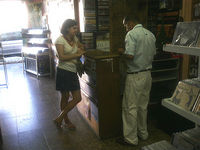Message from Brazil 1 - Vinyl Pelourinho
Tagged with: Brazil Pelourinho Bahia Salvador Planet Music Ajuda 39 MPB musica sertaneja forro samba bossa nova Caetano Veloso Ce Eterna Dimensao Zeca Pagodinho Tessa Burwood WorldMusic.co.uk World Music
This is the first report from our own correspondent Tessa Burwood who's currently out in Brazil. Tess will be sending in her reports as to what she sees, muses and gets up to over the next three weeks. In this one she's arrived in the city of Salvador in Bahia, Northern Brazil (traditionally cited as the most African of all Brazilian states) and set up base in the old slave area of Pelourinho, one of the most culturally vibrant areas of the city:
"Who said music shops were dead?"
"Who said music shops were dead? Planet Music and Ajuda 39 in Pelourinho are in a healthy state.
Avelar began working at Planet Music as a kid, because he spent so much time in there flicking through records that the shop assistant told him to go speak to the boss:
"From shop rat to boss via passion for music - I love my job!"
There's an exhaustive collection of MPB, musica sertaneja, forro, samba, everything you can think of when it comes to the music loving public that pass through Pelourinho. Apparently, the French always ask for bossa nova,
"Just as elegant as they like to think they are," says Avelar with a wry grin.
"German tourists don't like Brazilian music at all. They only buy CDs as presents for the folk back home, hardly even look at the covers or ask any questions. What can I say? They just don't dig us!"
Avelar's favourites include Pink Floyd and Kraftwerk, he knows all the dates of birth of everyone in the former, and listened to the latter when, during the Cold War the airwaves were flooded with American music, and anything deemed transgressive was contraband.
He was pleased to tell me that Caetano Veloso recently made up 500 copies of his seminal album "Ce" on vinyl for his closest 500 friends. Sony have opened a vinyl production unit down south, apparently.....
Round the corner at Ajuda 39, it's a vinyl purist's heaven - as you can see from the photos. Tekko works behind the counter by day and plays samba by night in a band called Eterna Dimensao. They're playing on Sunday in Rio Vermelho, I'm going to check them out. I asked him what was his favourite record in the whole shop, and it seemed he'd been mooning over it all afternoon! Zeca Pagodinho :)
Tomorrow, percussion class at 2pm, who knows where my rhythm's at?! "
Tessa Burwood for WorldMusic.co.uk
[There will be more from Tessa as she moves around Brazil in the next three weeks, including a trip to the remote settlement of São Braz in Bahia state to check out a village whose entire culture has been officially protected by the United Nations. Stay tuned.]
Womex 2010 - Editor's Highlights (Pt 3)
Tagged with: Womex Copenhagen Koncerthuset N'Faly Kouyate LaBrass Banda Blink Bomba Estereo Colombia Karina Buhr Dobet Gnahoré Mabon Wales Henrik Jansberg Baba Zula Denmark Baltic Nordic Emilia Amper Nyckelharpa Brazil Turkey Glyn Phillips Review
This is the third of my Editor's Highlights blogs from Womex 10 - the World Music Expo held in Copenhagen, Denmark last month. It deals with the third day of the expo - Sat 30th Oct 2010.
"... as if a whole battalion of brass bands was invading the hall"
"The daytimes at Womex were spent intensively networking at the Trade Fair, where we met some absolutely fascinating people and organisations; however whilst doing this there were often impromptu musical displays happening around the Forum. N'faly Kouyate, normally with the Afro Celt Sound System, was to be found at the Belgian Walloon stand playing his kora, the gentle sounds rippling out from his corner of the fair; two or three members of LaBrass Banda started a near stampede when they began to play in one of the stands - just they alone sounded as if a whole battalion of brass bands was invading the hall; a trio of what I think were very young musicians from the Lithuania/Latvia/Estonia area played some great music on bagpipes, guitar and tambourine, amongst other musical displays.
In particular a very sotto voce performance on the 'grassy hillock' at the centre of the Forum (in reality a mound of pallets covered over with rolls of real grass!) by the young Nordic folk quartet Blink was especially enjoyable. These "four women from five countries" - their own words - played a beautiful blend of music from their respective traditions, combining the voices of Danish-Norwegian Jullie Hjetland (a girl with a jaw-dropping length of hair in an enormous rope-plait) and the Finnish Lotta Hagfjors, with the Estonian fiddle of Johanna-Adele Jüssi and the Swedish nyckelharpa of the lovely Emilia Amper.
(www.myspace.com/musicblink)
(www.myspace.com/johannaadele)
(www.myspace.com/emiliaamper)
"... an energy level that could power the National Grid."
Sadly, I missed the young Welsh band, Calan, that night at the Koncerthuset (it was the turn of Wales to showcase its best in the offWomex Stage in Studio 2), which was a real pity since I'd very much enjoyed their 2008 album "Bling" and was looking forward to seeing them. However, I was able to catch and photograph the Colombian band Bomba Estéreo, a small band with an energy level that could power the National Grid. There was something about the intensity of the lead singer's performance that meant my camera was absolutely glued to her almost the entire time - even though she moved about so much it was difficult to get any decent pictures. Although they had a full-on punk and rock attitude and definitely a crowd-pleaser if placed in a festival type setting, I wasn't sure afterwards if I was even aware of the actual music they played. Certainly not music to put your feet up to . . .
(www.bombaestereo.com)
Brazilian art-rock-pop singer Karina Buhr's set was marred by the fact that for almost the entire time you couldn't see her, since the only lighting seemed to come from the intense red back-lighting. The whole concert seemed to be given in silhouette. Again I can hardly remember the music, just the frustration of trying to work out what the cat-suited singer was doing with the large blow-up plastic props in her hands that looked huge spiky dumb-bells.
(www.karinabuhr.com.br)
"beautiful voice, graceful movements, and trademark painted face"
On safer ground was the striking Ivorian singer, Dobet Gnahoré, who delivered a show full of confidence, artistry and grace in the main hall of the Koncerthuset (Studio 1). With her beautiful voice, fluid movements, and trademark painted face she held the concentration and the hearts of the packed hall. Too pregnant to safely dance - a big part of her show usually - she had one of the backing singers dance for her - and what a surprise that was. Dobet seated herself on a high stool at the back with the musicians and almost conducted the dance performance with her hands, whilst her singer leapt and swooped and spun and dropped with increasingly wild abandon to the music, getting more energetic and daring as the music took her someplace else. A great show that I wish I was able to see more of. But so many things to cover . . .
(www.dobetgnahore.com)
"A great live act, they were confident, professional and very tight"
Downstairs again to the very bowels of this amazing building and this time to see the last Welsh folk band of the night, Mabon. Although mostly Welsh, their approach is more accurately described as inter-celtic, since they weave many different strands and cultures into their music. Again, another exhilarating performance from a band I'd never seen before and had little idea what to expect. A great live act, they were confident, professional and very tight, accordion, fiddle, bass, guitar and drums working as one. The band's leader and main composer, the accordionist Jamie Smith, managed to dominate the stage even though he barely moved from his spot. Mabon soon had the crowd on their feet and there was a full-scale twmpath going on beneath the enormous Welsh Dragon pinned to the wall at the side of the auditorium. The Welsh supporters were obviously determined to show the rest of the world how to party and linked hands to dance like a huge human snake through the crowd. But Mabon are more than just a great live band; their album "Live at the Grand Pavilion" is as enjoyable played at home alone as it would be performed live at a venue (just close the curtains so the neighbours don't see your dodgy dance moves!).
(www.mabon.org/)
"How much exhilaration can a man take?"
I wandered out of Studio 2, slightly shell-shocked and somehow found myself in Studio 4 where the Nordic Club was based. I seemed to walk into the Danish equivalent of Mabon! Full house and mad dancing everywhere by the home crowd and a band that swung every bit as much as the one I'd just seen. I only found out later that it was the award-winning Danish fiddler Henrik Jansberg and his band (two guitars, double bass and percussionist - cajón, washboard and assorted cymbals and lumps of metal). Again: tight, confident, professional and with an enthusiastic band of supporters egging them on. How much exhilaration can a man take?
(www.jansberg.com/)
"I can hear all the festivals ringing their manager right now…"
Upstairs now to catch Turkish psychebelly trance masters, Baba Zula, the inventors of Oriental Dub. All efforts to pigeon-hole this legendary Anatolian band are pretty much worthless, since they pull in so many influences from psychedelic rock through electro-beat and trance to whistles, spoons, darbuka and electric-saz. Frontman, Murat Ertel, and spoon-clacking, cymbal-basher Levent Atman, both sported impressive moustaches - which got my vote straightaway! Then out came the dancers - whirling around the stage in colourful psychebelly outfits - as if Hawkwind had been transported to Istanbul. The whole show was a full-on audio-visual assault - and Baba Zula most certainly came out the conquering heroes. I can hear all the festivals ringing their manager right now…"
(www.babazula.com)
Glyn Phillips
WorldMusic.co.uk
Womex 2010 - Editor's Highlights (pt 2: Sexto Sentido)
Tagged with: Sexto Sentido Cuba Arlety Valdes Yudelkis LaFuente Eliene Castillo Wendy Vizcaino Chucho Valdes Guajiro The Way Bossa Cubana Mi Feeling RnB Soul Jazz Latin Womex Charlie Scotts Melvis Estevez Joao Donato Jorge Baglan Glyn Phillips
This is the second of my blogs about Womex 10, the World Music Expo, held in Copenhagen, Denmark, last month (Oct 2010). Here are some more of my highlights.
"On the Thursday I came across an all-girl Cuban group, Sexto Sentido, who were promoting their music from one of the Trade Fair stands. Unusually the girls were doing the entire promotion themselves with the aid of a German friend and, unable to secure a slot in the official Womex showcase, he had procured them a last minute offsite showcase gig at Charlie Scott's Jazz Club in the centre of Copenhagen. What was really different about this band was that the girls were at great pains to distance themselves from the stereotypical Cuban touring groups. This was evident not only in what they said, but in their posters and videos which owed more to Destiny's Child, TLC and a whole host of RnB singers than to what Europeans have come to expect of this magic isle.
"The most sublime contemporary soul and RnB, rich harmonies, jazzy licks, funky drums and bass and lyrics delivered perfectly in English as well as Spanish."
Confused, but intrigued, I popped on the headphones they proffered to me and was hit by the most sublime contemporary soul and RnB, rich harmonies, jazzy licks, funky drums and bass and lyrics delivered perfectly in English as well as Spanish. Wow. Not what I expected at all. So, if these girls were turning out Western commercial music (which coincidentally they wrote - lyrics and music - themselves), then what's the point? Why not just listen to the thousands of RnB stars (and wannabe's) out there who already sing this stuff in English? Ahh, but there you have it - not only are these four girls every bit as good as any of the best chart-toppers they have something that their North American neighbours don't have - and that's 'sabor'. There is an innate 'cuban-ness' to their music, a certain 'swing' that's incredibly subtle yet sets their music apart. I wasn't sure whether they even realised it, yet there it was - a warmth and sway that permeates the music and makes it stand out from the 'me too' RnB brigade . . .
"Trust me, these ladies are special. Very special indeed."
Trust me, these ladies are special. Very special indeed. The more I listened, the more I saw just how determined they are to do everything their own way, without reference to what people expect them to do. The music stopped being great soul, great jazz, great RnB, great bossa etc, but just great music. Period. Arlety Valdés, Yudelkis LaFuente, Eliene Castillo and (new girl) Wendy Vizcaíno are a force to be reckoned with. Imagine if Beyoncé, Mary J Blige, Mariah Carey and Alicia Keys were born and raised in Cuba, and had been friends since 13 years old. Because that's basically the story of Sexto Sentido. The four friends (which included their original singer Melvis Estevez) met at one of Havana's elite conservatoires designed to pick up emerging talent from a young age and nurture it no matter the child's background. They formed their band soon after and became unstoppable, receiving numerous awards and being sent by the Government all over the world as well as working with the cream of Cuban musicians such as Chucho Valdés. Melvis recently left and was replaced by the 21 year old Wendy (the other girls are all 28).
"... the ineffably groovy "Guajiro" had been a number one hit in Cuba this summer, making them millions of fans ..."
They can still do more typically Cuban music and told me their latest single, the ineffably groovy "Guajiro" had been a number one hit in Cuba this summer, making them millions of fans and reaching 90% of the population; the spin-off video from that remained high in the video charts for weeks on end too - making even the 'extras' into mini-celebrities!
Their first album, "Bossa Cubana", had a Russian producer and was supported by the Brazilian musician João Donato. It gave them their first hit (title track) and was a mix of international songs (included two intriguing Beatles covers) with their own compositions. The second album "Mi Feeling" was rooted in Cuba's indigenous jazz movement ('fílin') of the 60s and although a niche market, was rated as one of the best jazz CDs in the USA (2008) and is still often played on American jazz radio stations. Sadly though, Sexto Sentido don't own the copyright to these. The Cuban government record company do, as well as certain foreign producers - who bought the rights from Cuba to sell them in the US market. Hence their presence in Copenhagen to promote their own independent production of their third album "The Way" (written completely by them) and to look for opportunities to tour in Europe and take back control of their music.
I was invited to their one and only performance in Copenhagen the next night (Friday 29th October), yet this meant I would miss the vast majority of the other showcases that night over in the Koncerthuset. I 'ummed' and 'aahed' all the next day, but in the end I was too intrigued to see what they would be like live and decided to head over for an hour just to check them out and take some photos.
Charlie Scott's (no relation I think!) Jazz Club is run by an ex-patriate Scot (called Charlie, I suppose!) and is a friendly, atmospheric, upstairs club with a minuscule stage facing the bar (which was barely a yard or so in front!); most of the audience sat to the one side of the stage and the others on the other side of the bar. When I got there and went up the stairs, the door opened almost straight onto the drummer; the band - all brought over from Cuba and using borrowed instruments - consisting of a kit drummer, conguero, saxophonist, keys, bass and electric guitar and completely filled the stage - and that was minus their trumpeter (the amazing Thommy Lowry - Buena Vista & Afro-Cuban Allstars)! I wondered where the four girls were going to stand. The mike stands were placed on the floor since the singers couldn't fit anywhere else. I found myself standing almost face to face with them and was forced to find somewhere else to watch and listen.
"Their backing band alone were incredible! "
The performance was delayed by 20 minutes or so as they all struggled with the PA system and appalling feedback - an object lesson in the difference between the Cuban system they are used to and the capitalist. In Cuba, they earn next to no money at all (and don't own the copyright to their own music, only getting paid a single recording fee) yet at every concert there are highly trained sound engineers and roadies - the girls just have to turn up and start singing. Realising that they were suddenly responsible for having to do their own sound on borrowed equipment (and that Western bands even have to bring their own PA often just to do a gig) was a bit of a jolt it seemed. Still, everybody was patient and professional and it was eventually sorted out and the band went into an instrumental to warm up and set the scene. Believe me, just that first 'throwaway' tune would have been worth going off the beaten track for. Their backing band alone were incredible! I later found out that it wasn't surprising since they were all top musicians in Cuba, the drummer Jorge Baglan coming from NG La Banda and Paulito FG and the award-winning saxophonist Michel Herrera having performed with Winton Marsalis, to name just two.
"Their voices are pitch perfect, smooth as butter, rich as chocolate, and as for the harmonies . . . "
For the next hour Sexto Sentido delivered a set of music that blew the audience away. Their voices are pitch perfect, smooth as butter, rich as chocolate, and the harmonies .. complex, yet somehow natural, instantly comforting, yet constantly surprising. Just when you thought you'd got the measure of them, they explored another angle of the song. I kept wondering if the regulars there had ever heard anything like it. The standard was incredible! In Cuba, the girls have often played in big concert halls and gigs to thousands of people at a time, and yet here they were singing their hearts out to this small yet packed room of musos, jazzers and locals.
"The first set was a masterclass in soul, jazz, RnB, bossa, latin jazz and beyond."
The first set was a masterclass in soul, jazz, RnB, bossa, latin jazz and beyond. I was blown away by their version of The Beatles "Come Together" - I really didn't see that one coming! They said they'd take a five minute break and then be back. I didn't want the music to stop, but quite literally five minutes later, they took to the stage again (other less professional musicians take note!) and then really let rip for the remainder of the night. The second set started to mix in son and rumba and a hip-swinging version of their hit "Guajiro". By this time the standing crowd were dancing in every square inch they could find. Just when you thought it couldn't get any better than this, it did, Eliene throwing back her head, opening her lungs and letting rip like a true Soul Diva. I'd long since abandoned any thoughts of seeing the rest of the showcases that night (apologies to all the amazing bands I missed), but I knew that right at that moment there was nowhere else I'd rather be than standing in front of such consummate musicianship and singing.
"Just when you thought it couldn't get any better than this, it did ..."
So, are they really "world music"? Some other Womex delegates I spoke to were equally impressed by their abilities (besides being singers, songwriters, arrangers and choreographers the girls are all multi-instrumentalists in their own right - planning soon to release an album with every single thing written and performed by them); but these promotors struggled to conceptualise marketing an outfit like them. "So what are they: Salsa or Soul?", they'd say, "If only they'd do one or the other!". I think these delegates missed the point. Sexto Sentido are all of these things and more, much more. Imagine if people had said to Cuban super-group Irakere: "Just stick to doing versions of Guantanamera" . . .
"You see, it's not about "World Music"; it's about World Class Music. And Sexto Sentido are world class."
Who would like the music of Sexto Sentido? The short answer is anybody who likes fabulously sung music. Certainly anybody into jazz, soul, RnB, and all their affiliates would like it; anybody that likes Cuban music or indeed most latin american musics would like it. But their appeal is far wider than that: Pop? Certainly. Cutting edge Dance? Yep? Fusion? Of course. Tropical? Por supuesto! World Music? Undoubtedly. You see, it's not about "World Music"; it's about World Class Music. And Sexto Sentido are world class.
"… these four talented and truly gorgeous women deserve to go all the way."
My belief is that they're only just starting to explore their capabilities musically. They've already collaborated with Norman Cook and Guy Sigsworth on some House and Dance tracks, and are able to truly tackle anything they set their minds to. What I'm interested in is what they'll create themselves as they mature and synthesise their many influences. In a way they could end up with real world music: globally recognisable, yet - I fervently hope - without losing their idiosyncratic Cuban 'sabor'. I hope my 'sixth sense' is correct, because these four talented and - I can't hold back any longer, I just have to say it - truly gorgeous women deserve to go all the way. I hope they find 'the way', without losing their way."
Glyn Phillips
WorldMusic.co.uk
Womex 2010 - Editor's Highlights (part one)
Tagged with: worldmusic.co.uk world music Womex Copenhagen Denmark Koncerthuset Antonio Zambujo Papa Wemba LaBrass Banda Tremor ZZK Las Migas Criolina Glyn Phillips Reviews
Here at WorldMusic.co.uk we've recently returned from Womex 10 - the world's leading World Music Expo held this year in Copenhagen, Denmark. Over the space of five days it's a chance for the globe's leading movers and shakers in the sphere of world music to get together, meet new people, network, do deals, hear new bands and recordings and talk about the future of world music. We've had a great time with the other 2400 odd delegates, 1360 companies, 850 Festival and Concert bookers, 600 labels and distributors, 350 journalists and broadcasters and 300 artists.
Enough stats! Here is the first blog of my Womex 2010 highlights, taking in the first full day and night. Of the 40-50 official showcases, the 9 official 'unofficial' off-Womex showcases and the many unofficial showcases you can only take so many acts in no matter how hard you try and how organised you are. Of the ones I did manage to take in these are my standouts…
"a voice as pure as an angel's"
Antonio Zambujo currently Portugal's number one male fado singer - I've already writing a separate concert review of this (see under Reviews), but just to say, if you ever get the chance to see this man - go! Exquisite artistry and a voice as pure as an angel's - he had the audience utterly entranced and bewitched from the moment the first notes shimmered across the Koncerthuset. This guy and his band are stunning. (www.antoniozambujo.com)
"dancing in the aisles in musical ecstasy"
Later on that night in the same venue Papa Wemba the veteran Congolese rumbero had the audience dancing in the aisles in musical ecstasy - special mention must go to his solo encore track. Trust me, this guy didn't need a band behind him - he stood alone in front of a microphone at the edge of the stage and took us into his song; just Papa and his voice stripped naked. Once again the power of the human voice to haul our hearts up to new levels never ceases to astonish me. The audience of seasoned world music industry insiders agreed and clamoured for more. But there was no need for more - he'd said it all. Papa had sung his heart out. He bowed, turn around and walked off-stage. Priceless moment. (www.papawemba.fr)
"Great live band!"
Germany's LaBrass Banda take 'Oompah' music to a new level too! Ditching the unintentionally quasi-comic image of traditional Bavarian brass they come nearer to the Balkan heavy brass vibe (even in leiderhausen!) crossed with some heavy rock attitude. Difficult to describe, all I can say is that, as a live band these guys are very exciting indeed. Great live band! (www.labrassbanda.com)
"an utterly impelling groove"
Another band taking the traditional music of their country and giving it some serious 'rockismo' are the Argentinian band, Tremor. These three young guys, (Leonardo Martinelli, Camilo Carabajal & Gerardo Farez), mix the many elements of their country's rich musical heritage (Argentina's not all tango guys!!) and play charangos (tiny 10-string instruments - originally made from armadillo shells, now of wood), t'arkas (wooden flutes with a particularly harsh sound) and bombo legüero (the deep bass goatskin drum) with electric guitar, keys, loops and melodica! They take what seems a very unusual mix of instruments and what at first seems to be a sparse set and sound and create an utterly impelling groove powered in particular by Camilo's thundering bombo rhythms and punk attitude. As their press release said: "This is no languid lounge music . . . digital folklore for a new generation". Great festival band - and lovely guys offstage too! (www.zzkrecords.com/artist/tremor)
"a voice that could floor a man at a hundred paces . . . "
I only managed to catch the dying notes of Galician bagpiper Cristina Pato on the Sounds from Spain stage, but made sure I was well in place for the multinational Barcelonian flamenco band Las Migas. This was definitely one of my highlights of Womex: four beautiful - and extremely talented - women on violin/accordion, two Spanish guitars and cajon/vocals (accompanied by Andalucian percussionist Carlos Cortés Bustamante). The musicianship evident on-stage would be enough to make it to my highlights list on its own, but what really catapults them above other similarly talented bands is the stage presence of their lead singer, the cantaora Silvia Pérez Cruz. Seated upon her cajón centrestage, she is like a magnet to the eyes and ears - no mean feat considering the skills and charisma of her compañeras - and certainly for me that night she had the elusive duende so sought after in flamenco. Posture, grace, facial expression, delicate hand-movements and a voice that could floor a man at a hundred paces . . . She effortlessly travels between flamenco and jazz in the most subtle nuances of her voice. Offstage she is tiny compared to the brilliant guitarist (and curvaceously statuesque beauty!) Marta Robles Crespo, but onstage Silvia is like a queen holding court. As you can tell, she ruled my head, ears and heart that night. The reality is that the whole band were stupendous, the playful Lisa Bause (from Germany) swapping between violin and accordion, the slightly more serious Isabelle Laudenbach (France) on guitar, the effortless fluidity of Marta Robles and not forgetting the sympathetically subtle percussion of Carlos Cortes. I came not knowing at all what to expect - I left utterly converted. ¡Viva Las Migas! (www.lasmigas.com)
"Criolina rock!"
That first night finished off with a DJ set from three DJs (Oops, Pezao & Barata) from the Brazilian collective, Criolina. Hailing from Brasilia, the capital of their country, they have been together for five years, playing every Monday and pulling an average audience of 700 a time (yes, on a Monday!) with spin off nights in São Paulo and Rio de Janeiro. Only three of the five main guys came over for this, but what a show. It's not easy to get a large room of world musos rocking at 1.45 in the morning after they've worked all day long and then seen half a dozen or more amazing bands already that night, but these guys pulled it off. Working as one they selected, dissected, tweaked and twiddled over and around each other without let up as they shared one musical vision and one brain split between three bodies. What truly made them good was not so much the technical virtuosity they displayed whilst setting bits of one tune against the rhythm of another, but the choice of raw material they sourced it all from (and it wasn't just Brazilian music either). This was no boringly predictable mishmash of pre-programmed loops and beats from the myriad of DJ-software out there, but authentic tunes - real music - that would probably sound perfect played with no cutting and splicing anyway; and it's that quality that shone through - these guys really love the tunes they played. That's the way I like to DJ myself - if you can't get excited about the music yourself, how can you expect the audience too. It worked. I was knackered beyond belief when they came on and yet within a few minutes I was gyrating round the floor as if I'd just stepped out fresh and ready. By the time they hit the cumbias, I was good to go all night. Criolina rock! (www.criolina.com) - for a taste of what they actually played that night go to: soundcloud.com/criolina/sets/sistema-criolina-live-copenhagen-womex-2010
Glyn Phillips
WorldMusic.co.uk
Salsa Britannica (aka the problem with the UK Latin Scene)
Tagged with: Brazilian Cuban General Latin American Reggae Salsa Hombre Elastico
This is an article by DJ El Hombre Elastico
(first appeared on his myspace site: www.myspace.com/hombreelastico).
“One of my abiding gripes is the narrowmindedness of the people promoting/putting on the nights. Sadly, since the later 90s, the ‘latin scene’ in the UK got quickly taken over by ‘dance teachers’ - often people with no knowledge (or love) of the music but with an eye for a chance to make some money.
A night out became nothing more than an extended series of dance classes with people herded together to learn dance moves that they would never actually use on a dance floor, an enforced hierarchy of ‘Beginners’, ‘Improvers’ (yuk!) and the Premier Division (sorry I mean ‘The Advanced’) and an emphasis on ’styling’ and ‘technique’. It’s beginning to parody the film “Strictly Ballroom” - let alone the bit in “Life Of Brian” where he tells his devoted followers not to copy him as they are all individuals. OK, all together now: “Yes, Dance Teacher, We Are All Individuals”.
Let’s face it, the music comes first - it MUST do; otherwise, we might as well dispense with the music and just ‘dance-by-numbers’ - (THINK of the phrase: “1,2,3…pause, 5,6,7″ and say it in your dance teacher’s voice. You see!). Most of these dance teachers can’t even recognise what clave a tune is in. These people have a deep inbuilt fear of new musical trends, as well as a fear of ‘old’ music and anything that does not fit into their boxes of ‘hot-and-spicy-but must-be-classy’ and ‘can-we-make-money-teaching/inventing-dance-moves-to-this?’ In practice this has resulted in the virtual monopoly of salsa music in the clubs (with some merengue) and a nod now and then to bachata and reggaetón.
I’ve been DJing since the late 80s and was, - along with my dear friend and colleague Zuppa Inglese - the first ‘latin music’ DJ in Birmingham (who now remembers the all-nighters at Los Andes restaurant?). This predates the “salsa scene” in Brum (and most of the country outside of London and Manchester).
Back then we would drop crazy big band cumbias, chippy porros, groovy gaita, steamy boogaloos, aching bachatas, rootsy currulao, giddy latin jazz, sonorous rumbas, slow guajiras and son montunos, bouncy bossas, dreamy mpb, manic frevo, as well as bomba, plena, forro, salsa dura, salsa romantica, zouk, kaseko, kompas… in fact anything we could get our hands on and sounded good - and people liked it, even if they didn’t know the “proper” way to dance to it.
Both Zuppa and me still DJ like that to this day. We believe that given a choice most people actually like a variety of tone, pace, dynamics, instrumentation, rhythm, cultural references, etc and there’s no crime in dancing how you want to or even (shock! horror!) actually enjoying the music without dancing to it
(”Quick! Call the Salsa Police! Get this man a 12 week Emergency Dance Course”) KER-CHING!!!
However, in the mid-late 90s it all began to change. I remember dropping some Panamanian ragga and reggae at one Birmingham club, only to have the promoter rush up to me and kill the music (yes, live!) in case I attracted the wrong sort of clientele into his club! Consequently all this has stifled the musical development of the audience and therefore the whole scene.
Guys, it’s no good saying “It’s what the customer wants” - since the vast majority of your ‘pupils’ only hear what YOU play them. Call me old-fashioned, call me arrogant, but I believe there’s a responsibility to inform and even to educate as well (no-one’s saying that it can’t also be a lot of fun).
Latin music is vast and wonderfully diverse - let’s just discover it, share it and revel in it all.
[HEAR ENDETH THE LESSON ACCORDING TO EL HOMBRE ELASTICO]





























